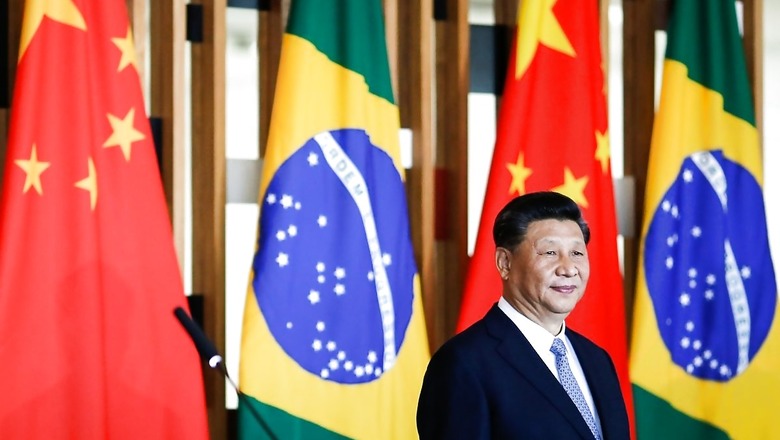
views
The first leaders’ meeting of the Quadrilateral grouping, or Quad, took place virtually on March 12, 2021, within 50 days of United States President Joe Biden assuming office. New Delhi, Tokyo, Canberra and Washington, the four Quad capitals, were pleased with the speedy reaffirmation of the continued commitment of all members, especially the US, to the geostrategic grouping.
Even though Quad is not aimed at any nation, the mood in Beijing was sombre. Hitherto dismissive, China now lashed out, terming Quad as “enclosed small cliques with ideology as the yardstick is the sure way to destroy the international order”. The Chinese angst found an echo in Moscow, Tehran, Islamabad and Ankara, albeit to varying degrees and for reasons both similar and dissimilar.
Predictably, Islamabad is happy to jump onto any bandwagon that it is even remotely prejudicial to India’s interest. It harbours innumerable grievances against Washington with anti-US sentiment running high in the country. Its relationship with China is symbiotic. Pakistan looks up to Turkey as a role model, is wooing Moscow, and is anxious to get back into the Iranian good books.
Despite being a NATO ally, the Trump administration did not hesitate in sanctioning Turkey under the Countering America’s Adversaries Through Sanctions Act, better known as CAATSA, for importing S-400 Russian missiles, in December 2020. Conversely, burying centuries of hostilities, Presidents Putin and Erdogan struck a personal friendship, and are overseeing a remarkable expansion in bilateral engagement.
ALSO READ | ‘Friendships are Not Alliances of Containment’: The China Factor in India’s Quad Calculus
Sunni Turkey and Shia Iran have been frenemies vying for influence among Muslim nations but also collaborating in matters of trade, energy and in respect of Syria and Saudi Arabia. That Azerbaijan, which shares a border with Iran, could humble Tehran-supported Armenia with the help of Ankara in a 44-day conflict ending in November 2020, was a strategic setback for Iran.
Until recently, Erdogan used to rile the Chinese by describing the treatment of Uighurs in Xinjiang as genocide. That principled position was sacrificed at the altar of political expediency. Trade, economic, security and defence ties have since been deepening.
The USA, “The Great Satan”, has been the bane of the Islamic Republic of Iran’s existence. Currently, Tehran is reeling under crippling sanctions imposed by the Trump regime. In such testing times, Beijing defied the US by continuing to import hydrocarbons from Iran. In March 2021, it concluded a 25-year “strategic cooperation pact” worth $400 billion to buy Iranian oil, invest in various sectors and enhance military cooperation.
On the other hand, Russia-Iran relations are more tactical than strategic. According to ‘Foreign Affairs’, Russia “has emerged as Iran’s primary security guarantor, military collaborator, and material supplier”. Nevertheless, Russia, the former superpower, is in an unenviable situation. Since taking over Crimea in 2014, it has been sanctioned and ostracised by the West, especially the US. The proud nation now finds itself playing second fiddle to China.
As such, in this maze of mutating alignments, two constants stand out — the reigning (even if a bit jaded) hegemon, the US; and the aspiring hegemon, the People’s Republic of China. The US-led Quad is already in place; the China-led Quintet has yet to take shape, though the seeds have been planted.
Quad is a grouping of democratic nations that want to safeguard rule of law, freedom of navigation, sovereignty and territorial integrity, while at the same time pushing back at nihilist forces. Quad nations have come together by choice and caught the imagination of the free world. Its agenda is evolving as is amply evident from the outcome of the Quad summit.
And then there is the Quintet, a strikingly disparate group of five nations — dictatorial, authoritarian or theocratic — which have little in common like a shared grievance against the US. Most of them are in conflict with neighbours and are often seen as being part of the problem instead of a solution. Given a choice, some of them will gladly jump ship.
The other common thread is China, for which an enemy’s enemy is a natural friend. Beijing’s guiding principle is opportunism. It is not overly burdened with propriety, equity, the sanctity of commitments or international norms.
It has wantonly engaged in industrial espionage, IPR theft, undermining global institutions, intimidating its neighbours, disregarding international laws and conjuring up alternative narratives when the reality was found to be inconvenient. The world is still traumatised by the coronavirus pandemic believed to have originated from Wuhan, China.
Taking advantage of its sizeable foreign exchange reserves and industrial overcapacity, China has been busy entrapping country after country in a web of debt through the Belt and Road Initiative (BRI). There is little transparency about the modalities, costing, pricing or economic viability of the BRI projects. Vanity projects to satisfy the whims of authoritarian leaders are not unknown.
ALSO READ | As CCP Turns 100, Xi Jinping Must Know That No Country Can Singlehandedly Take on the World
As observed above, China was prompt in lambasting Quad as an “enclosed small clique” choosing to forget that the Shanghai Cooperation Organisation (SCO) set up by it in 2002 was in fact meant to be precisely that. The People’s Daily pulled no punches — “…SCO member countries … call on Western countries to leave Central Asia”. One of its original purposes was to counterbalance NATO. The US request for observer status in SCO was promptly rejected in 2005. However, at the prodding of Russia, India was given the observer status in 2005 along with Pakistan and Iran; that changed SCO’s complexion.
During their meeting on March 22, 2021, the foreign ministers of Russia and China took a second stab at the establishment of a ‘Regional Security Dialogue Platform’. According to Xinhua, they “briefed each other on…their respective relations with the US” and asked the US to “halt unilateral bullying, stop meddling in other countries’ domestic affairs, and stop forming small circles to seek bloc confrontation”. Typical Chinese tactics to lay the blame at the door of the opponent!
Chinese clout is unmistakable and so is its ability to stand up to the US. The big question is not whether China can stitch together a Quintet or a ‘Red Quad’. It can. The real question is, to what end? An amorphous grouping of the kind taking shape may become a cause of concern for the comity of nations, particularly if it takes a cue from the Chinese diplomatic playbook.
The views expressed in this article are those of the author and do not represent the stand of this publication.
The author is Former Envoy to South Korea and Canada and Official Spokesperson of the Ministry of External Affairs.
Read all the Latest News, Breaking News and Coronavirus News here.




















Comments
0 comment